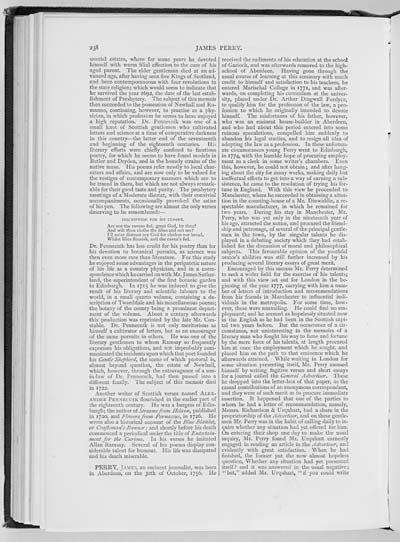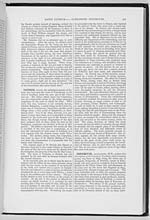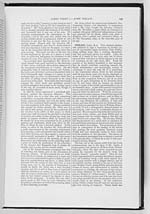238
monial estates, where for some years he devoted
himself with warm filial affection to the care of his
aged parent. The elder gentleman died at an ad-
vanced age, after having seen five Kings of Scotland,
and been contemporaneous with four revolutions in
the state religion; which would seem to indicate that
he survived the year 1692, the date of the last estab-
lishment of Presbytery. The subject of this memoir
then succeeded to the possession of Newhall and Ro-
manno, continuing, however, to practise as a phy-
sician, in which profession he seems to have enjoyed
a high reputation. Dr. Pennecuik was one of a
small knot of Scottish gentlemen who cultivated
letters and science at a time of comparative darkness
in this country�the latter end of the seventeenth
and beginning of the eighteenth centuries. His
literary efforts were chiefly confined to facetious
poetry, for which he seems to have found models in
Butler and Dryden, and in the homely strains of the
native muse. His poems refer mostly to local char-
acters and affairs, and are now only to be valued for
the vestiges of contemporary manners which are to
be traced in them, but which are not always remark-
able for their good taste and purity. The presbytery
meetings of a Moderate district, with their convivial
accompaniments, occasionally provoked the satire
of his pen. The following are almost the only verses
deserving to be remembered:�
INSCRIPTION FOR MY CLOSET.
Are not the ravens fed, great God, by thee?
And wilt thou clothe the lilies and not me?
I'll ne'er distrust my God for clothes nor bread,
Whilst lilies flourish, and the raven's fed.
Dr. Pennecuik has less credit for his poetry than for
his devotion to botanical pursuits, as science was
then even more rare than literature. For this study
he enjoyed some advantages in the peripatetic nature
of his life as a country physician, and in a corre-
spondence which he carried on with Mr. James Suther-
land, the superintendent of the first botanic garden
in Edinburgh. In 1715 he was induced to give the
result of his literary and scientific labours to the
world, in a small quarto volume, containing a de-
scription of Tweeddale and his miscellaneous poems;
the botany of the county being a prominent depart-
ment of the volume. About a century afterwards
this production was reprinted by the late Mr. Con-
stable. Dr. Pennecuik is not only meritorious as
himself a cultivator of letters, but as an encourager
of the same pursuits in others. He was one of the
literary gentlemen to whom Ramsay so frequently
expresses his obligations, and not improbably com-
municated the incidents upon which that poet founded
his Gentle Shepherd, the scene of which pastoral is,
almost beyond question, the estate of Newhall,
which, however, through the extravagance of a son-
in-law of Dr. Pennecuik, had then passed into a
different family. The subject of this memoir died
in 1722.
Another writer of Scottish verses named ALEX-
ANDER PENNECUIK flourished in the earlier part of
the eighteenth century. He was a burgess of Edin-
burgh; the author of Streams from Helicon, published
in 1720, and Flowers from Parnassus, in 1726. He
wrote also a historical account of the Blue Blanket,
or Craftsman's Banner; and shortly before his death
commenced a periodical under the title of Entertain-
ment for the Curious. In his verses he imitated
Allan Ramsay. Several of his poems display con-
siderable talent for humour. His life was dissipated
and his death miserable.
PERRY, JAMES, an eminent journalist, was born
in Aberdeen, on the 3Oth of October, 1756. He
received the rudiments of his education at the school
of Garioch, and was afterwards removed to the high-
school of Aberdeen. Having gone through the
usual course of learning at this seminary with much
credit to himself and satisfaction to his teachers, he
entered Marischal College in 1771, and was after-
wards, on completing his curriculum at the univer-
sity, placed under Dr. Arthur Dingwall Fordyce,
to qualify him for the profession of the law, a pro-
fession to which he originally intended to devote
himself. The misfortunes of his father, however,
who was an eminent house-builder in Aberdeen,
and who had about this period entered into some
ruinous speculations, compelled him suddenly to
abandon his legal studies, and to resign all idea of
adopting the law as a profession. In these unfortun-
ate circumstances young Perry went to Edinburgh,
in 1774, with the humble hope of procuring employ-
ment as a clerk in some writer's chambers. Even
this, however, he could not obtain; and after hang-
ing about the city for many weeks, making daily but
ineffectual efforts to get into a way of earning a sub-
sistence, he came to the resolution of trying his for-
tune in England. With this view he proceeded to
Manchester, where he succeeded in obtaining a situa-
tion in the counting-house of a Mr. Dinwiddie, a re-
spectable manufacturer, in which he remained for
two years. During his stay in Manchester, Mr.
Perry, who was yet only in the nineteenth year of
his age, attracted the notice, and procured the friend-
ship and patronage, of several of the principal gentle-
men in the town, by the singular talents he dis-
played in a debating society which they had estab-
lished for the discussion of moral and philosophical
subjects. This favourable opinion of the youthful
orator's abilities was still further increased by his
producing several literary essays of great merit.
Encouraged by this success Mr. Perry determined
to seek a wider field for the exercise of his talents;
and with this view set out for London in the be-
ginning of the year 1777, carrying with him a num-
ber of letters of introduction and recommendations
from his friends in Manchester to influential indi-
viduals in the metropolis. For some time, how-
ever, these were unavailing. He could find no em-
ployment; and he seemed as hopelessly situated now
in the English as he had been in the Scottish capi-
tal two years before. But the occurrence of a cir-
cumstance, not uninteresting in the memoirs of a
literary man who fought his way to fame and fortune
by the mere force of his talents, at length procured
him at once the employment which he sought, and
placed him on the path to that eminence which he
afterwards attained. While waiting in London for
some situation presenting itself, Mr. Perry amused
himself by writing fugitive verses and short essays
for a journal called the General Advertiser. These
he dropped into the letter-box of that paper, as the
casual contributions of an anonymous correspondent,
and they were of such merit as to procure immediate
insertion. It happened that one of the parties to
whom he had a letter of recommendation, namely,
Messrs. Richardson & Urquhart, had a share in the
proprietorship of the Advertiser, and on these gentle-
men Mr. Perry was in the habit of calling daily to in-
quire whether any situation had yet offered for him.
On entering their shop one day to make the usual
inquiry, Mr. Perry found Mr. Urquhart earnestly
engaged in reading an article in the Advertiser, and
evidently with great satisfaction. When he had
finished, the former put the now almost hopeless
question, Whether any situation had yet presented
itself? and it was answered in the usual negative;
"but," added Mr. Urquhart, "if you could write

![]() Universal Viewer |
Universal Viewer | ![]() Mirador |
Large image | Transcription
Mirador |
Large image | Transcription
![]()

